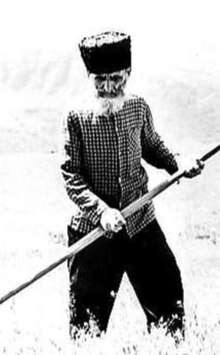Shirali Muslimov
Shirali Farzali Muslimov (also Mislimov) (Azerbaijani: Şirəli Fərzəli oğlu Müslümov, pronounced [ʃiɾæˈli mysˈlymov]; Russian: Ширали Фарзали оглы Муслимов; allegedly March 26, 1805 – September 2, 1973) was an Azerbaijani[1] shepherd with Talysh ethnicity from the village of Barzavu in the Lerik region of Azerbaijan, a mountainous area near the Iranian border. He claimed to be the oldest person who ever lived when he died on September 2, 1973 at the alleged age of 168.
Shirali Muslimov | |
|---|---|
 Shirali Muslimov in 1970 | |
| Born | Shirali Muslimov March 26, 1805 (alleged, disputed) |
| Died | September 2, 1973 (aged 168 years, 160 days) Barzavu, Azerbaijan SSR, Soviet Union |
| Nationality | Azerbaijani, Azerbaijani Soviet Socialist Republic (currently Azerbaijan Republic) |
| Occupation | Shepherd |
| Known for | Oldest Person/Man Ever (alleged, disputed) |
| Children | 23 |
Life
According to legend, Muslimov worked hard every day, up to 168 years, did not smoke or drink, but ate fruits, vegetables, wholemeal bread, chicken broth, low-fat cheese and yogurt. He had several wives through his lifetime. Muslimov became ill with pneumonia between 1972 and 1973, but survived only to die later in 1973.
Muslimov's story was picked up in 1973 by National Geographic Magazine,[2] which told that on the occasion he still rode horseback and tended an orchard planted in the 1870s. National Geographic later recanted on the claim. The same story was told by the Guinness Book of World Records, stated as unconfirmed along with other similar claims.[3]
His marital status was also controversial. According to National Geographic, he had a 120-year-old wife whom he had married 102 years earlier.
The only evidence in favor of Muslimov's age claim is an official passport that listed his birthdate. Muslimov had no known birth certificate.
Fame
The case of Muslimov became known in 1963, when a young photojournalist of TASS, Kalman Kaspiev, went to Barzavu to interview the centenarian. The story was picked up by the Soviet press, by the National Geographic, and by the Danone company, which for promotional reasons suggested that the longevity of Muslimov was linked to a diet of dairy, and yogurt in particular. This interest changed the life of the small Azeri village, which was connected to the electricity grid and started receiving radio and television broadcasts.
In the 1970s many Westerners were made aware of these extreme claims of longevity in Azerbaijan and elsewhere in the Caucasus region when a U.S. Danone yogurt commercial invoked some of these people to suggest that the secret of their long lives lay in the frequent consumption of yogurt.
See also
References
- Советский комитет солидарности стран Азии и Африки, Институт востоковедения (Академия наук СССР), Институт Африки (Академия наук СССР). Asia and Africa today. — Asia and Africa Today, 1990. :Shirali Mislimov, an Azerbaijani peasant, who was the oldest among the Soviet Supercentenarians, died in 1973 at the age of 212. His surviving widow at that time was 120..
- Alexander Leaf, (Jan. 1973). "Search for the Oldest People". National Geographic, pp. 93–118.
- The Guinness Book of Records, 1974
External links
- A lesson in longevity
- Sept. 17, 1973 TIME Magazine obituary (bottom of page)
- "Azerbaijan's Legendary Centenarian", a 1996 article detailing the story behind Muslimov's claims of incredible longevity
- Centenarians in Azerbaijan
http://yourenotfromaroundhere.com/blog/long-livers-lerik-azerbaijan/